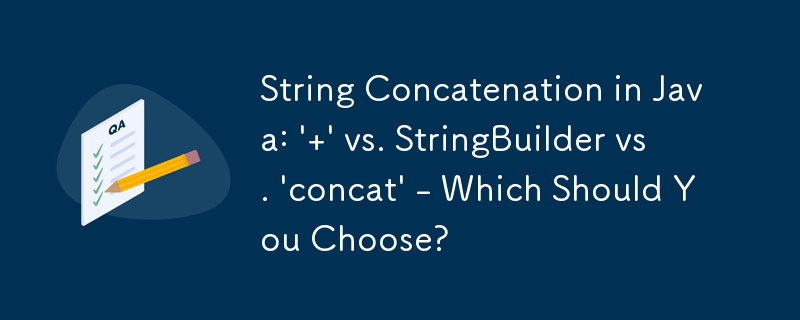

String Concatenation in Java: Selecting the Optimal Approach - ' ' vs. StringBuilder vs. 'concat'
When dealing with string concatenation in Java, developers often face a choice between using the ' ' operator, StringBuilder, or the 'concat' method. Understanding the appropriate use cases for each is crucial for achieving efficient and effective code.
' ' Operator
The ' ' operator is commonly used for simple string concatenation. However, it creates a new String object with every concatenation, which can lead to memory overhead and performance bottlenecks.
StringBuilder
StringBuilder is designed specifically for string manipulation and concatenation. It provides a mutable string buffer that can be appended to efficiently. Unlike the ' ' operator, StringBuilder does not create new String objects with each concatenation, significantly reducing memory consumption and improving performance, especially within loops.
'concat' Method
The 'concat' method is part of the String class. While it also concatenates strings, it returns a new String object, behaving similarly to the ' ' operator in terms of performance. Therefore, it is generally not recommended for use when performance is a priority.
In modern versions of Java, the compiler often optimizes ' ' operations by converting them to StringBuilder's append method. As a result, for simple string concatenation, the performance difference between ' ' and StringBuilder may be negligible. However, in scenarios where performance is crucial, especially within loops, StringBuilder remains the preferred choice.
The above is the detailed content of String Concatenation in Java: ' ' vs. StringBuilder vs. 'concat' - Which Should You Choose?. For more information, please follow other related articles on the PHP Chinese website!
 Today's Toutiao gold coin is equal to 1 yuan
Today's Toutiao gold coin is equal to 1 yuan
 How to configure the path environment variable in java
How to configure the path environment variable in java
 What are the microcontroller programming software?
What are the microcontroller programming software?
 Tutorial on making word document tables
Tutorial on making word document tables
 Cancel WeChat campaign
Cancel WeChat campaign
 How to export excel files from Kingsoft Documents
How to export excel files from Kingsoft Documents
 How to use php web page source code
How to use php web page source code
 How to set path environment variable
How to set path environment variable




